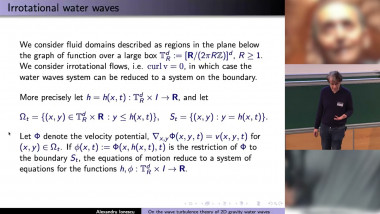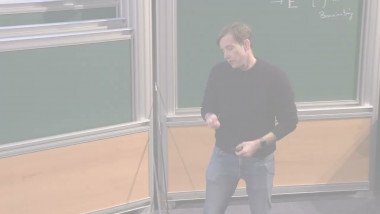
On the Wave Turbulence Theory of 2D Gravity Water Waves
De Alexandru Ionescu

Anomalous Diffusivity and Regularity for Random Incompressible Flows
De Scott Armstrong
Apparaît dans la collection : Combinatorics and Arithmetic for Physics - 2024
The Nambu-determinant Poisson brackets on $\mathbb{R}^d$ are expressed by the formula $ \{f,g}_d (\mathbf{x}) = \varrho(\mathbf{x}) \cdot \det\bigl( \partial(f,g,a_1,...a_{d-2}) / \partial(x^1,...,x^d) \bigr), $ where $a_1$, $\ldots$, $a_{d-2}$ are smooth functions and $x^1$, $\ldots$, $x^d$ are global coordinates (e.g., Cartesian), so that $\varrho(\mathbf{x})\cdot\partial_{\mathbf{x}}$ is the top-degree multivector. For an example of Nambu--Poisson bracket in classical mechanics, consider the Euler top with $\{x,y}_3 = z$ and so on cyclically on $\mathbb{R}^3$. Independently, Nambu's binary bracket $\{{-},{-}}_d$ with Jacobian determinant and $d-2$ Casimirs $a_1$, $\ldots$, $a_{d-2}$ belong to the Nambu (1973) class of $N$-ary multi-linear antisymmetric polyderivational brackets $\{{-},\ldots,{-}}_d$ which satisfy natural $N$-ary generalizations of the Jacobi identity for Lie algebras. In the study of Kontsevich's infinitesimal deformations of Poisson brackets by using `good' cocycles from the graph complex, we detect case-by-case that these deformations preserve the Nambu class, and we observe new, highly nonlinear differential-polynomial identities for Jacobian determinants over affine manifolds. In this talk, several types of such identities will be presented. (Work in progress, joint with M.~Jagoe Brown, F.~Schipper, and R.~Buring; special thanks to the Habrok high-performance computing cluster.)
